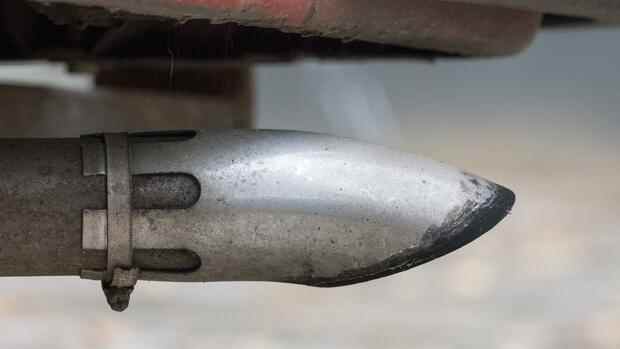Germany has already committed to the exit date of 2035.
(Photo: imago/Seeliger)
Brussels In thirteen years, no new petrol and diesel-powered cars will be registered in the EU. There should also be no exceptions for e-fuels. The members of the European Parliament agreed on this, thereby largely confirming a draft law by the Commission. It is not yet certain that the member states of the EU will also agree, but it is considered likely.
The directive stipulates that from 2035 new passenger cars and light commercial vehicles with a gross vehicle weight of up to 3.5 tons may no longer emit any CO2. This can only be achieved with electric motors.
The CDU, CSU and FDP had campaigned to create a market for electricity-based fuels, i.e. e-fuels, with lower reduction targets and crediting models, which are electricity-based and can also be produced in a climate-neutral manner. This is a “technology-open” approach, while the proposed regulation only allows electric drives.
However, the corresponding amendments did not find a majority in the plenary session of Parliament. Among other things, the liberal MPs from other countries had voted against it. The majority of Parliament saw no point in promoting e-fuels, as they consume a lot of electricity to produce and are therefore less efficient than running electric cars.
Top jobs of the day
Find the best jobs now and
be notified by email.
The demand by Green MPs to phase out combustion engines earlier did not go through either.
>> Read here: Why climate protectors are against e-fuels
The President of the Association of the Automotive Industry, Hildegard Müller, criticized the decision. She spoke of a “decision against the citizens, against the market, against innovation and against modern technologies”. In large parts of Europe there is insufficient charging infrastructure for electric cars.
The VDA President criticizes the decision to ban combustion engines.
(Photo: dpa)
The ADAC also regrets the vote of the EU Parliament. “The ambitious climate protection goals in traffic cannot be achieved with electromobility alone,” said the automobile club on Wednesday evening. “Therefore it would have been necessary to also open up a perspective for the climate-neutral fueled combustion engine.”
The CDU member of the Bundestag Thomas Bareiß made a similar statement. He continues to hope for changes: “The EU would make a big mistake with a final ban on combustion engine technology,” he said. He called for framework conditions for the development of fuels that are climate-friendly and affordable. Internal combustion engines would be in use in various applications and on all continents for many decades to come.
“Milestone on the way to clean mobility”
The Greens, on the other hand, speak of a decision “for the future of Europe as an automotive location”: “The future best electric cars, including the latest batteries, will come from here,” said MP Michael Bloss. “This is a turning point that we are now contesting. Anyone who still relies on the combustion engine harms industry and the climate and violates European law.”
The decision is also in the interests of environmental protection organizations. “The end of combustion engines in 2035 is a milestone on the way to clean mobility,” said Stef Cornelis from the organization Transport & Environment. “This decision brings investment security for the German automotive industry and will trigger massive investments in charging infrastructure, battery technology and other sectors of the economy.”
“The best electric cars of the future, including the latest batteries, will come from here.” Michael Bloss, MEP Die Grünen/EFA
The decision of the EU Parliament, on the other hand, does not go far enough for Deutsche Umwelthilfe. Federal Managing Director Jürgen Resch described the result of the vote as a major setback for climate protection in transport. It torpedoes all efforts to make Europe independent of fossil oil more quickly. Although phasing out combustion engines is the right step, it will come far too late in 2035, he said.
The EU’s goal is to become climate neutral by 2050. As cars are driven on Europe’s roads for an average of 15 years, the Commission had proposed that by 2035 only zero-emission vehicles would be allowed.
In addition, Parliament also agreed on sharing the burden of CO2 reduction among the member states and on new rules for counting natural CO2 sinks.
Other laws in the “Fit for 55” climate protection package are being delayed. MEPs could not agree on a reform of emissions trading. This is considered to be a key instrument for significantly reducing CO2 emissions in industry over the next few years and for enforcing climate-neutral production by 2050.
More: The most important climate protection law fails in the EU Parliament
